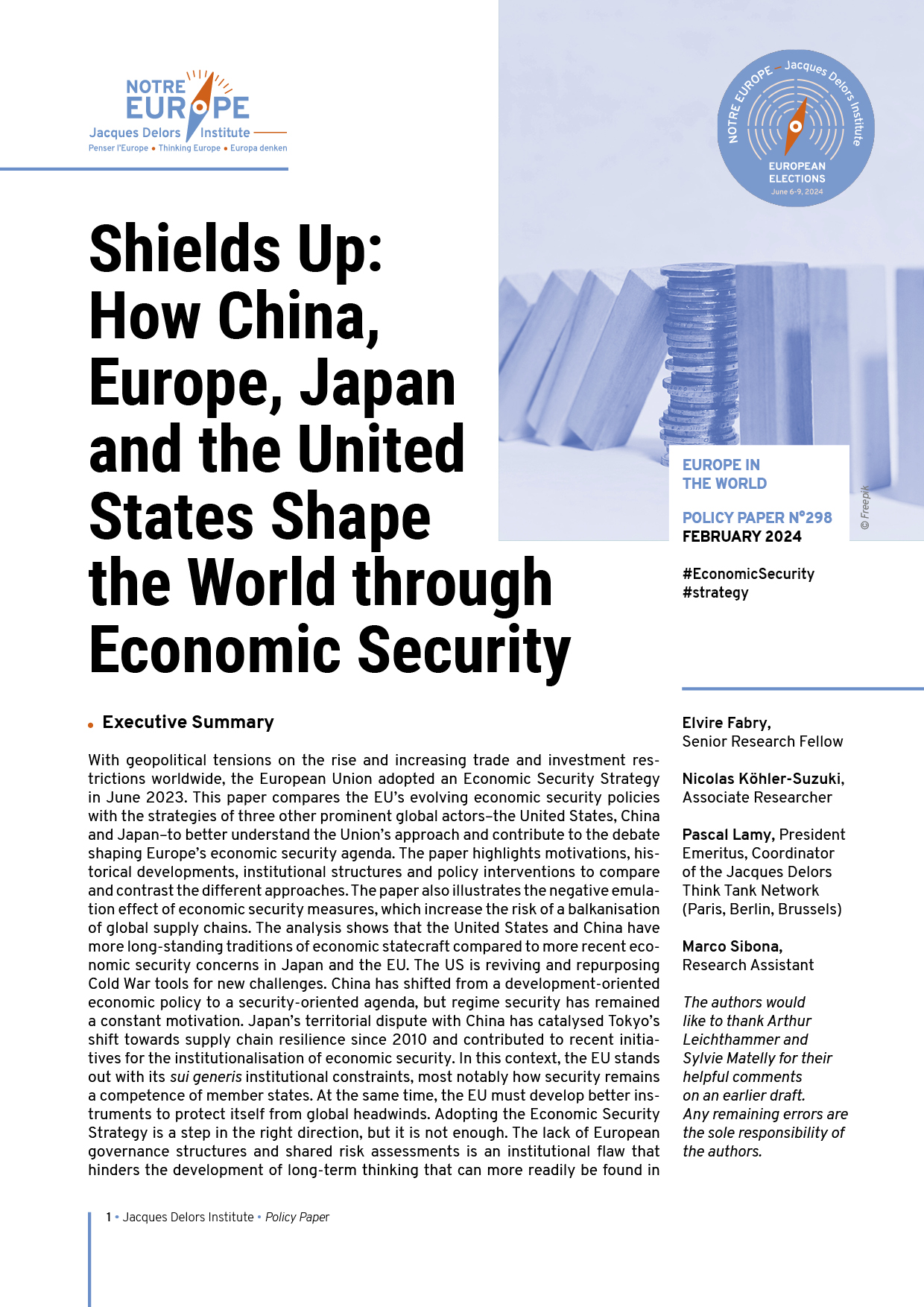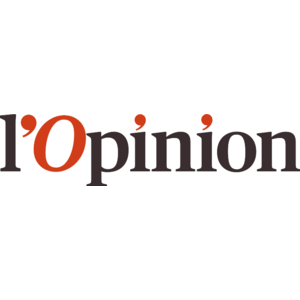Policy paper N°297
Shields Up: How China, Europe, Japan and the United States Shape the World through Economic Security
Fabry, E., Köhler-Suzuki, N., Lamy, P., Sibona, M. “Shields Up: How China, Europe, Japan and the United States Shape the World through Economic Security”, Policy Paper N°297, Jacques Delors Institute, February 2024
With geopolitical tensions on the rise and increasing trade and investment restrictions worldwide, the European Union adopted an Economic Security Strategy in June 2023. This paper compares the EU’s evolving economic security policies with the strategies of three other prominent global actors–the United States, China and Japan–to better understand the Union’s approach and contribute to the debate shaping Europe’s economic security agenda. The paper highlights motivations, historical developments, institutional structures and policy interventions to compare and contrast the different approaches. The paper also illustrates the negative emulation effect of economic security measures, which increase the risk of a balkanisation of global supply chains. The analysis shows that the United States and China have
more long-standing traditions of economic statecraft compared to more recent economic security concerns in Japan and the EU. The US is reviving and repurposing Cold War tools for new challenges. China has shifted from a development-oriented economic policy to a security-oriented agenda, but regime security has remained a constant motivation. Japan’s territorial dispute with China has catalysed Tokyo’s shift towards supply chain resilience since 2010 and contributed to recent initiatives for the institutionalisation of economic security. In this context, the EU stands out with its sui generis institutional constraints, most notably how security remains a competence of member states. At the same time, the EU must develop better instruments to protect itself from global headwinds. Adopting the Economic Security Strategy is a step in the right direction, but it is not enough. The lack of European governance structures and shared risk assessments is an institutional flaw that hinders the development of long-term thinking that can more readily be found in Beijing and Washington. The Union needs to establish a more dynamic, responsive and inclusive infrastructure involving both member states and the business sector– two key actors in the implementation of the European economic security strategy.
Our key recommendations are to establish an Economic Security Commissioner to facilitate coordination and lead the process, create an Economic Security EU Council configuration to incentivise member states in creating their own structures and establish a Forum on Economic Security to bring together member states and companies to adjust the risk evaluation methodology and lead to the creation of a European Agency on Economic Security, tasked with developing analytical instruments for monitoring and foresight objectives.
The paper also emphasises the role of the Single Market as the Union’s main economic security asset and how it should be seen not only as a space for fair competition but also as a space for capacity mutualisation. The EU should also draw inspiration from the Japanese concept of ‘strategic indispensability’ in critical technologies to position itself as a crucial actor in global technology value chains and fortify niche technology leadership. At the same time, the Union should reinvigorate its partnership efforts, as international and trade agreements remain a comparative strength.
SUR LE MÊME THÈME
ON THE SAME THEME
PUBLICATIONS
A world turned upside down

A new internal security strategy for the European Union

The Road to a New European Automotive Strategy: Trade and Industrial Policy Options

MÉDIAS
MEDIAS
Face à l’alliance entre Trump et Musk, le silence assourdissant des Européens

« Rien ne réjouit plus Wall Street et Pékin que la fragmentation de l’Europe »

D’un monde à l’autre : l’effondrement des piliers de l’Occident

ÉVÉNEMENTS
EVENTS
European Conference | Harvard

Euroquestions #55 | European foreign and defense policy tested by the war in Ukraine [FR]

Transatlantic relations in the age of Joe Biden: What implications for the European Union? [FR]

The Future of Trade: How can Europe and the United States join forces to rewrite the post-COVID trade agenda

Euroquestions | Accord d’investissements UE-Chine : Quelle dimension politique ? Quels impacts économiques ?

Euroquestions | Relance et puissance : mots d’ordre de la rentrée européenne

Quel rôle pour l’Europe dans un monde post-Covid ?

Madrid, 10 April 2019 – European Think Thank Summit

Paris, 10 January 2019 – The EU and the new silk roads

Paris, 21 September 2018 – Trump, Brexit and the new challenges of European trade policy: is the European response adapted?















